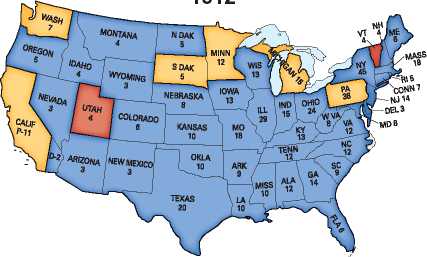The Democrats made the most of the opportunity offered by the Republican schism. Had they nominated a conservative or allowed Bryan a fourth chance, they would probably have ensured Roosevelt’s election. Instead, after battling through forty-six ballots at their convention in Baltimore, they nominated Woodrow Wilson, who had achieved a remarkable liberal record as governor of New Jersey. Incidentally, Wilson, a Virginia native, was one of three southern candidates for the nomination, further evidence that the sectional conflicts of Reconstruction had been forgotten.
Although as a political scientist Wilson had criticized the status quo and taken a pragmatic
1019

Democratic (Wilson)
Progressive (T. Roosevelt)
Republican (Taft)
1912: Divided Republicans, Democratic Victory In 1912, when Theodore Roosevelt chose to run as a Progressive, he took away millions of votes from the Republican Taft. This ensured Democrat Woodrow Wilson's landslide election.
Approach to the idea of government regulation of the economy, he had objected strongly to Bryan’s brand of politics. In 1896 he voted for the Gold Democratic party candidate instead of Bryan. But by 1912, influenced partly by ambition and partly by the spirit of the times, he had been converted to progressivism. He called his brand of reform the New Freedom.
The federal government could best advance the cause of social justice, Wilson reasoned, by eradicating the special privileges that enabled the “interests” to flourish. Where Roosevelt had lost faith in competition as a way of protecting the public against monopolies, Wilson insisted that competition could be restored. The government must break up the great trusts, establish fair rules for doing business, and subject violators to stiff punishments. Thereafter, the free enterprise system would protect the public from exploitation without destroying individual initiative and opportunity. “If America is not to have free enterprise, then she can have freedom of no sort whatever,” he said. Although rather vague, this argument appealed to thousands of voters who found the growing power of large corporations disturbing, but who hesitated to make the thoroughgoing commitment to government control of business that Roosevelt was advocating.
Roosevelt’s reasoning was perhaps theoretically more sound. He called for a New Nationalism. Laissez-faire made less sense than it had in earlier times. The complexities of the modern world seemed to call for a positive approach, a plan, the close application of human intelligence to social and economic problems.
But being more in line with American experience than the New Nationalism, Wilson’s New
Freedom had much to recommend it. The danger that selfish individuals would use the power of the state for their own ends had certainly not disappeared, despite the efforts of progressives to make government more responsive to popular opinion. Any considerable expansion of national power, as Roosevelt proposed, would increase the danger and probably create new difficulties. Managing so complicated an enterprise as an industrialized nation was sure to be a formidable task for the federal government. Furthermore, individual freedom of opportunity merited the toleration of a certain amount of inefficiency.
To choose between the New Nationalism and the New Freedom, between the dynamic Roosevelt and the idealistic Wilson, was indeed difficult. Thousands grappled with this problem before going to the polls, but partisan politics determined the outcome of the election. Taft got the hard-core Republican vote but lost the progressive wing of the GOP to Roosevelt. Wilson had the solid support of both conservative and liberal Democrats. As a result, Wilson won an easy victory in the Electoral College, receiving 435 votes to Roosevelt’s 88 and Taft’s 8. The popular vote was Wilson, 6,286,000; Roosevelt, 4,126,000; and Taft, 3,484,000.
If partisan politics had determined the winner, the election was nonetheless an overwhelming endorsement of progressivism. The temper of the times was shown by the 897,000 votes for Eugene Debs, who was again the Socialist candidate. Altogether, professed liberals amassed over 11 million of the 15 million ballots cast. Wilson was a minority president, but he took office with a clear mandate to press forward with further reforms.
•••-[Read the Document Roosevelt, The New Nationalism at Www. myhistorylab. com




 World History
World History









